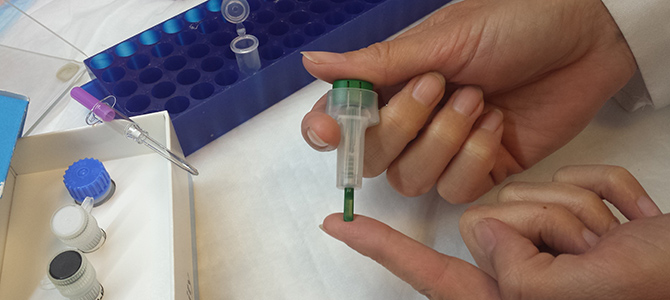
UA Scientist in Phoenix Helping Develop Test for Monitoring Biological Effects of Radiation, Could Save Lives

Simple Blood Test Could be Used By Astronauts, Cancer Patients to Check Radiation Exposure
Imagine a simple blood test that could confirm just how much radiation was reaching your cancerous tumor, or just how much radiation exposure an astronaut is receiving on a mission to Mars.
A University of Arizona College of Medicine – Phoenix faculty member is part of team that is developing cutting-edge tests that eventually could be used in just that fashion.
“We are that much closer to having a test that could be used to measure the amount of radiation being focused on a particular body area, which could save lives in the event of a radiological accident, or for better assessing the radiation dose delivered to a specific tissue providing more precise treatment of cancer,” said Frederic Zenhausern, PhD, MBA. “But this could also help in better understanding the biological mechanisms of tissue resistance to radiation and other effects.”
The research is part of the university’s overall effort to advance initiatives in precision health, which aims to improve delivery of specific treatments and preventative measures in relation to the unique aspects of each patient and their individual disease process.
Zenhausern is part of a team, led by researchers at Duke University in Durham, N.C., that was recently awarded an additional $10.4 million contract to continue its advancement of the radiation exposure blood test. The award comes from the Biomedical Advanced Research and Development Authority (BARDA), a division of the U.S. Department of Health and Human Services. For more information about the grant, visit Duke Medicine.
The Center for Applied NanoBioscience and Medicine, run by Zenhausern, pioneered radio-genomic studies in Arizona, which resulted in several grant awards from federal agencies. Over the years, the team also worked with international clinical groups and hospitals to develop multiple molecular-based diagnostic tests that ultimately can be used by individuals and public health systems to facilitate improved, precise treatment.
About the College
Founded in 2007, the University of Arizona College of Medicine – Phoenix inspires and trains exemplary physicians, scientists and leaders to advance its core missions in education, research, clinical care and service to communities across Arizona. The college’s strength lies in our collaborations and partnerships with clinical affiliates, community organizations and industry sponsors. With our primary affiliate, Banner Health, we are recognized as the premier academic medical center in Phoenix. As an anchor institution of the Phoenix Bioscience Core, the college is home to signature research programs in neurosciences, cardiopulmonary diseases, immunology, informatics and metabolism. These focus areas uniquely position us to drive biomedical research and bolster economic development in the region.
As an urban institution with strong roots in rural and tribal health, the college has graduated more than 1,000 physicians and matriculates 130 students each year. Greater than 60% of matriculating students are from Arizona and many continue training at our GME sponsored residency programs, ultimately pursuing local academic and community-based opportunities. While our traditional four-year program continues to thrive, we will launch our recently approved accelerated three-year medical student curriculum with exclusive focus on primary care. This program is designed to further enhance workforce retention needs across Arizona.
The college has embarked on our strategic plan for 2025 to 2030. Learn more.